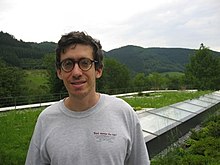Noam Elkies
| Noam Elkies | |
|---|---|
 Noam Elkies in 2007 | |
| Born | (1966-08-25) August 25, 1966 New York City |
| Nationality | American |
| Alma mater | Columbia University, Harvard University |
| Awards | Putnam Fellow Levi L. Conant Prize (2004) |
| Scientific career | |
| Fields | Mathematics |
| Institutions | Harvard University |
| Doctoral advisor | Benedict Gross Barry Mazur |
| Doctoral students | Henry Cohn[1] |
Noam David Elkies (born August 25, 1966) is an American mathematician and professor of mathematics at Harvard University. At the age of 26, he became the youngest professor to receive tenure at Harvard. He is also a chess master and an accomplished chess composer.
Contents
1 Early life
2 Work in mathematics
3 Music
4 Chess
5 Awards and honors
6 References
7 External links
Early life
Elkies spent eight years of his youth in Israel, later moving to New York City.[2] In 1981, at age 14, he was awarded a gold medal at the 22nd International Mathematical Olympiad, receiving a perfect score of 42 and becoming one of just 26 participants to attain this score,[3] and one of the youngest ever to do so. Elkies graduated from Stuyvesant High School in 1982[4][5] and went on to Columbia University, where he won the Putnam competition at the age of sixteen years and four months, making him one of the youngest Putnam Fellows in history.[6] He was a Putnam Fellow two more times during his undergraduate years. After graduating as valedictorian at age 18 with a summa cum laude in Mathematics and Music, he earned his Ph.D. at the age 20 under the supervision of Benedict Gross and Barry Mazur at Harvard University.[7]
From 1987 to 1990 he was a junior fellow of the Harvard Society of Fellows.[8]
Work in mathematics
In 1987, he proved that an elliptic curve over the rational numbers is supersingular at infinitely many primes. In 1988, he found a counterexample to Euler's sum of powers conjecture for fourth powers.[9] His work on these and other problems won him recognition and a position as an associate professor at Harvard in 1990.[4] In 1993, he was made a full, tenured professor at the age of 26. This made him the youngest full professor in the history of Harvard.[10] Along with A. O. L. Atkin he extended Schoof's algorithm to create the Schoof–Elkies–Atkin algorithm.
Elkies also studies the connections between music and mathematics; he is on the advisory board of the Journal of Mathematics and Music.[11] He has discovered many new patterns in Conway's Game of Life[12] and has studied the mathematics of still life patterns in that cellular automaton rule.[13] Elkies is an associate of Harvard's Lowell House.[14]
Music
He is a bass-baritone and plays the piano for Harvard Glee Club. In an article Jameson N. Marvin the director of the Glee Club compares him to Bach or a Mozart citing "his gifted musicality, superior musicianship and sight-reading ability".[15]
Chess
Elkies is a composer and solver of chess problems (winning the 1996 World Chess Solving Championship).[10] He holds the title of National Master from the United States Chess Federation, but he no longer plays competitively.[16]
Awards and honors
In 1994 he was an invited speaker at the International Congress of Mathematicians in Zurich.[17] In 2004 he received a Lester R. Ford Award[18]
and the Levi L. Conant Prize.[19]
In 2017 he was elected to the National Academy of Sciences.[20]
References
^ "Henry Cohn: Adjunct Professor, Discrete Mathematics". Massachusetts Institute of Technology, Department of Mathematics. Retrieved 10 August 2018..mw-parser-output cite.citation{font-style:inherit}.mw-parser-output q{quotes:"""""""'""'"}.mw-parser-output code.cs1-code{color:inherit;background:inherit;border:inherit;padding:inherit}.mw-parser-output .cs1-lock-free a{background:url("//upload.wikimedia.org/wikipedia/commons/thumb/6/65/Lock-green.svg/9px-Lock-green.svg.png")no-repeat;background-position:right .1em center}.mw-parser-output .cs1-lock-limited a,.mw-parser-output .cs1-lock-registration a{background:url("//upload.wikimedia.org/wikipedia/commons/thumb/d/d6/Lock-gray-alt-2.svg/9px-Lock-gray-alt-2.svg.png")no-repeat;background-position:right .1em center}.mw-parser-output .cs1-lock-subscription a{background:url("//upload.wikimedia.org/wikipedia/commons/thumb/a/aa/Lock-red-alt-2.svg/9px-Lock-red-alt-2.svg.png")no-repeat;background-position:right .1em center}.mw-parser-output .cs1-subscription,.mw-parser-output .cs1-registration{color:#555}.mw-parser-output .cs1-subscription span,.mw-parser-output .cs1-registration span{border-bottom:1px dotted;cursor:help}.mw-parser-output .cs1-hidden-error{display:none;font-size:100%}.mw-parser-output .cs1-visible-error{font-size:100%}.mw-parser-output .cs1-subscription,.mw-parser-output .cs1-registration,.mw-parser-output .cs1-format{font-size:95%}.mw-parser-output .cs1-kern-left,.mw-parser-output .cs1-kern-wl-left{padding-left:0.2em}.mw-parser-output .cs1-kern-right,.mw-parser-output .cs1-kern-wl-right{padding-right:0.2em}
^ Altman, Daniel (9 February 1995). "Math and Music: For the Moment". The Harvard Crimson.
^ "Noam Elkies's results". International Mathematical Olympiad.
^ ab Elkies, Noam D. "CV". Noam Elkies. Department of Mathematics, Harvard University. Retrieved 10 August 2018.
^ Castillo, Tom (April 20, 2000). "Fifteen Minutes: Gnoshin' with Noam". The Harvard Crimson.
^ Gallian, Joseph A. "The Putnam Competition from 1938–2006" (PDF). Archived from the original (PDF) on 2006-11-13. Retrieved 2007-10-31.
^ The Mathematics Genealogy Project – Noam Elkies
^ "Harvard University. Society of Fellows. Current and Former Junior Fellows". Archived from the original on 2013-01-16. Retrieved 2013-01-16.
^ "Mathematicians Find New Solutions To An Ancient Puzzle". 2008.
^ ab McClain, Dylan Loeb (August 28, 2010), "Skilled at the Chessboard, Keyboard and Blackboard", The New York Times
^ "Editorial Board of Mathematics and Music".
^ Game of Life Status page, Jason Summers.
^ Elkies, Noam D. (1998). "Voronoi's Impact on Modern Science, Book I". Proc. Inst. Math. Nat. Acad. Sci. Ukraine. 21: 228–253. arXiv:math.CO/9905194.
^ "Lowell House: SCR". Retrieved 2009-07-27.
[dead link]
^ Morantz, Alison D. (November 30, 1988). "Music + Math: A Common Equation?". The Harvard Crimson.
^ Noam D Elkies rating card, USCF
^ http://www.mathunion.org/db/ICM/Speakers/SortedByLastname.php
^ "Paul R. Halmos – Lester R. Ford Awards". Mathematical Association of America. Retrieved 10 August 2018.
^ "2004 Conant Prize" (PDF), Notices of the American Mathematical Society, 51 (4): 433–434, April 2004
^ National Academy of Sciences Members and Foreign Associates Elected, National Academy of Sciences, May 2, 2017.
External links
Personal site of Noam Elkies at Harvard University
Noam Elkies at the Mathematics Genealogy Project
Endgame Explorations – an 11-part series of articles by Noam Elkies in Chess Horizons
Noam Elkies on LifeWiki